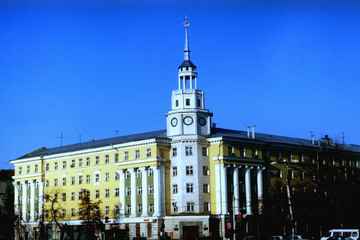Voronezh
 Voronezh city (1990 est. pop. 894,000), capital of Voronezh region, central European Russia, on the Voronezh River.
Voronezh city (1990 est. pop. 894,000), capital of Voronezh region, central European Russia, on the Voronezh River.
Founded in 1586 as a frontier fortress against Crimean and Nogai Tatar attacks from the southern steppe, it became a shipbuilding center in the Azov campaign (1695-96) of Peter I. It has been important as a commercial and cultural centre since the 1830s. During World War II it was largely destroyed (1942-43) when a German advance was stopped there; it was rebuilt completely after the war.
A river port and a major industrial centre in a black-earth agricultural region, it has industries producing machinery, synthetic rubber, oil, and food products. A nuclear power station operates at Voronezh. The architectural monuments, the Nikolsk church (early 18th cent.), and the Potemkin palace (18th cent.) were restored. The Univ. of Voronezh, originally the Univ. of Tartu, was transferred there in 1918. The poet Koltsov was born at Voronezh. There are Scythian burial mounds outside the city.
In city there are 1380 industrial enterprises (including 150 large), registered more than 140 firms with the foreign capital. Among their founders firms from Germany, Czechia, Liechtenstein, USA, Italy, England, Bulgaria and Yugoslavia. From the countries of near foreign countries are submitted: Ukraine, Byelorussia and Uzbekistan. The foreign trade turnover in 1999 has made about 200 million US dollars. In output the city occupies 14th place among the cities - centres of the Russian Federation.
Voronezh has the advanced network of the higher professional educational establishments, which are carrying out preparation of experts, their retraining and improvement of professional skill, research and cultural - educational activity. Today in Voronezh there are 21 state higher schools (among which 7 are branches of universities and academies of Moscow and Saint Petersburg), 2 municipal institutes and 11 not state higher educational institutions. Practically all higher educational institutions of Voronezh have contracts on cooperation with universities of Great Britain, Germany, Spain, Bulgaria, China, USA, France, Ireland, Denmark, Czechia and other countries. Representatives of 89 countries of the world study today in Voronezh. Quality of higher education is provided with brilliant teaching structure of higher schools - 524 doctors of sciences and 2497 candidates of sciences. More than 100 scientists of city are members of the Russian and international academies.
Voronezh is considered as cultural capital of Central-Chernozem Krai. This reputation is created by remarkable theatres, museums, libraries and cinema halls, but first of all known writers, artists, composers, actors, whose creativity makes glory of Russia.
CITIES OF RUSSIA
Abakan I
Aginskoye I
Anadyr I
Arkhangelsk I
Astrakhan I
Barnaul I
Belgorod I
Birobidzhan I
Blagoveshensk I
Bryansk I
Cheboksary I
Chelyabinsk I
Cherkessk I
Chita I
Ekaterinburg I
Elista I
Gorno-Altaisk I
Groznyi I
Ioshkar-Ola I
Irkutsk I
Ivanovo I
Izhevsk I
Kaliningrad I
Kaluga I
Kazan I
Kemerovo I
Khabarovsk I
Khanty-Mansiysk I
Kirov I
Kostroma I
Krasnodar I
Krasnoyarsk I
Kudymkar I
Kurgan I
Kursk I
Kyzyl I
Lipetsk I
Magadan I
Maikop I
Makhachkala I
Moscow I
Murmansk I
Nalchik I
Naryan-Mar I
Nizhny Novgorod I
Norilsk I
Novgorod the Great I
Novosibirsk I
Omsk I
Orenburg I
Oryol I
Penza I
Perm I
Petropavlovsk-Kamchatsky I
Petrozavodsk I
Pskov I
Rostov the Great I
Ryazan I
Saint-Petersburg I
Salekhard I
Samara I
Saransk I
Saratov I
Smolensk I
Stavropol I
Syktyvkar I
Tambov I
Tomsk I
Tula I
Tver I
Tyumen I
Ufa I
Ulan-Ude I
Ulyanovsk I
Vladikavkaz I
Vladimir I
Vladivostok I
Volgograd I
Vologda I
Voronezh I
Yakutsk I
Yaroslavl I
Yuzhno-Sakhalinsk I
|